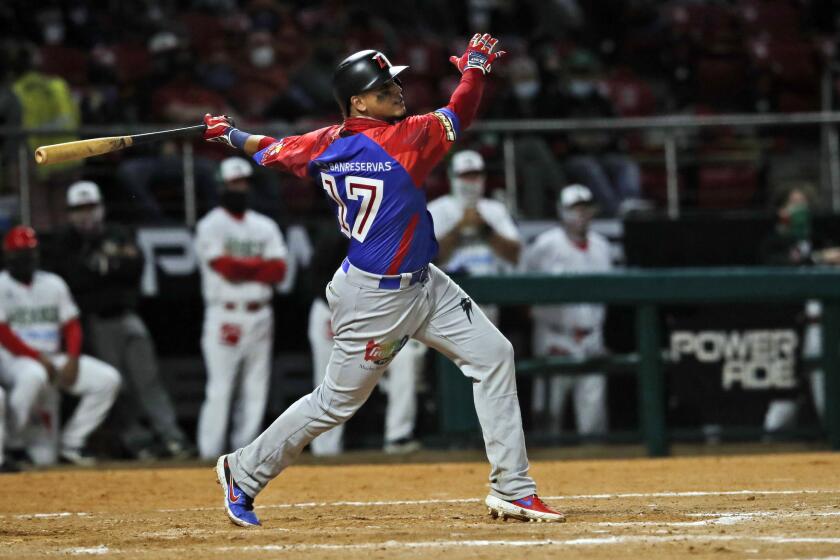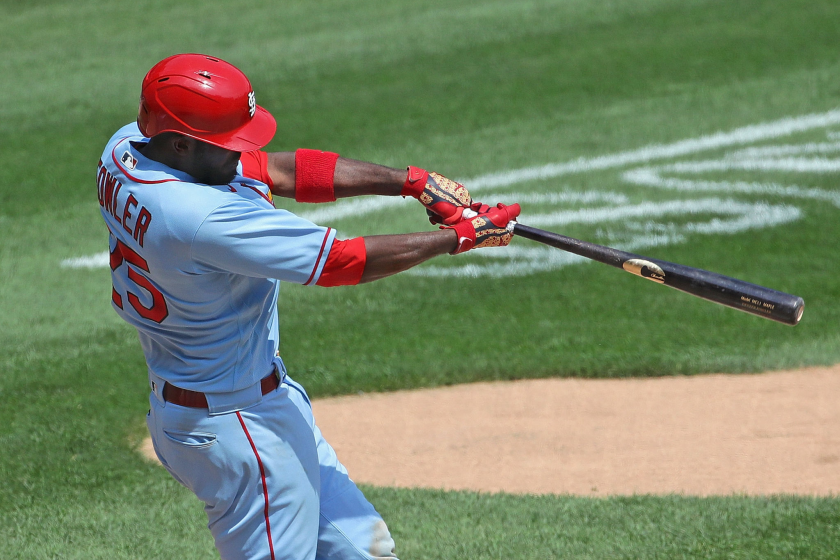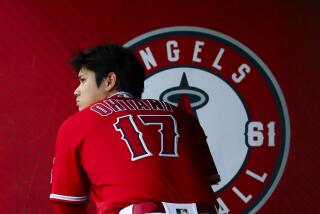Shohei Ohtani agrees to two-year, $8.5-million contract with Angels
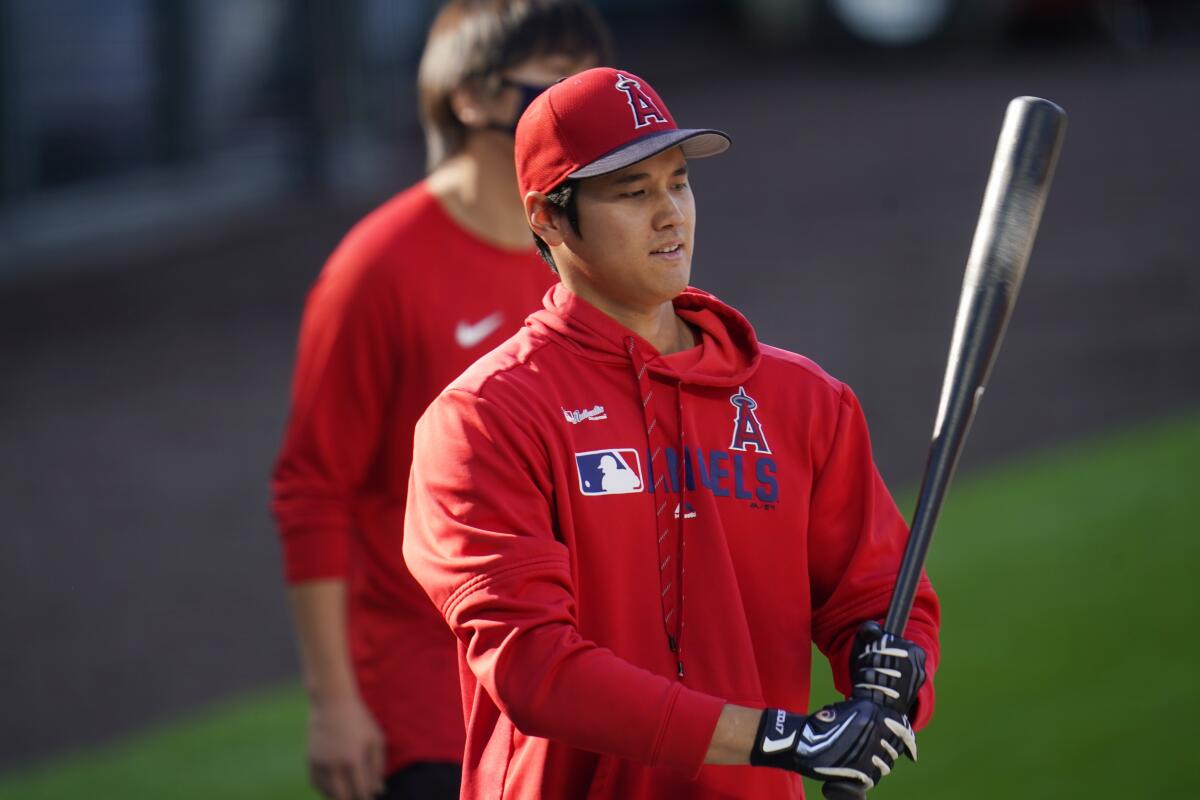
- Share via
Frustration mounted for Shohei Ohtani last season. So much the Angels’ two-way star called his efforts “pathetic” in an online interview with Kyodo News two months after its conclusion.
Rather than wallow in self-pity, Ohtani attacked his offseason regimen with renewed purpose. He revamped his strength training and nutrition. He ratcheted up the intensity of his hitting sessions. He let go on the mound, too, simulating gamelike situations.
“This was Shohei really wanting to own his career and own his offseason and do something different,” said agent Nez Balelo, a co-head of CAA Sport’s baseball division.
Ohtani’s dedication paid off Monday. After roughly 48 hours of negotiation, he signed a two-year, $8.5-million contract with the Angels and avoided a hearing in his first year of arbitration eligibility.
The news arrived nearly a month after Ohtani’s representatives and the Angels came to an impasse on how large a raise he deserved as he entered his fourth major league season. At the time, it was reported that Ohtani sought a salary of $3.3 million for 2021. The figure was $800,000 more than the Angels were willing to commit.
Now Ohtani, 26, will receive $3 million this season and $5.5 million in 2022 before becoming arbitration-eligible once again in 2023. Barring an extension, he would become a free agent ahead of the 2024 season.
General manager Perry Minasian in a conference call characterized Ohtani’s deal as one with “risk and reward to both sides” but added that it made sense to lock Ohtani into a multiyear agreement.
The Angels signed outfielder Juan Lagares, who played eight seasons with the New York Mets, to a minor league deal with an invitation to spring training.
Coming off arguably one of the strangest and most disappointing seasons of his career, Ohtani committed himself to an intense winter program that differed from his previous offseason workouts. The vigor with which Ohtani approached his training has been apparent in each of the reports Minasian has received since joining the Angels in mid-November.
“He definitely put in the work and that’s what’s pretty impressive, is just the amount of time and energy this guy puts into his craft,” Minasian said. “When you combine that with the talents, I think we feel like he’s going to be a huge part of this club and help us win games in multiple ways. We believe he’s a difference-maker type player.”
The Angels historically have been a “file-and-trial” team, meaning they don’t negotiate with arbitration-eligible players after the mid-January deadline to exchange figures and before a hearing occurs. But they’ve rarely needed to rely on that method, having settled all arbitration salaries ahead of the deadline for eight consecutive seasons before outfielder Brian Goodwin refused to budge last winter and had a hearing.
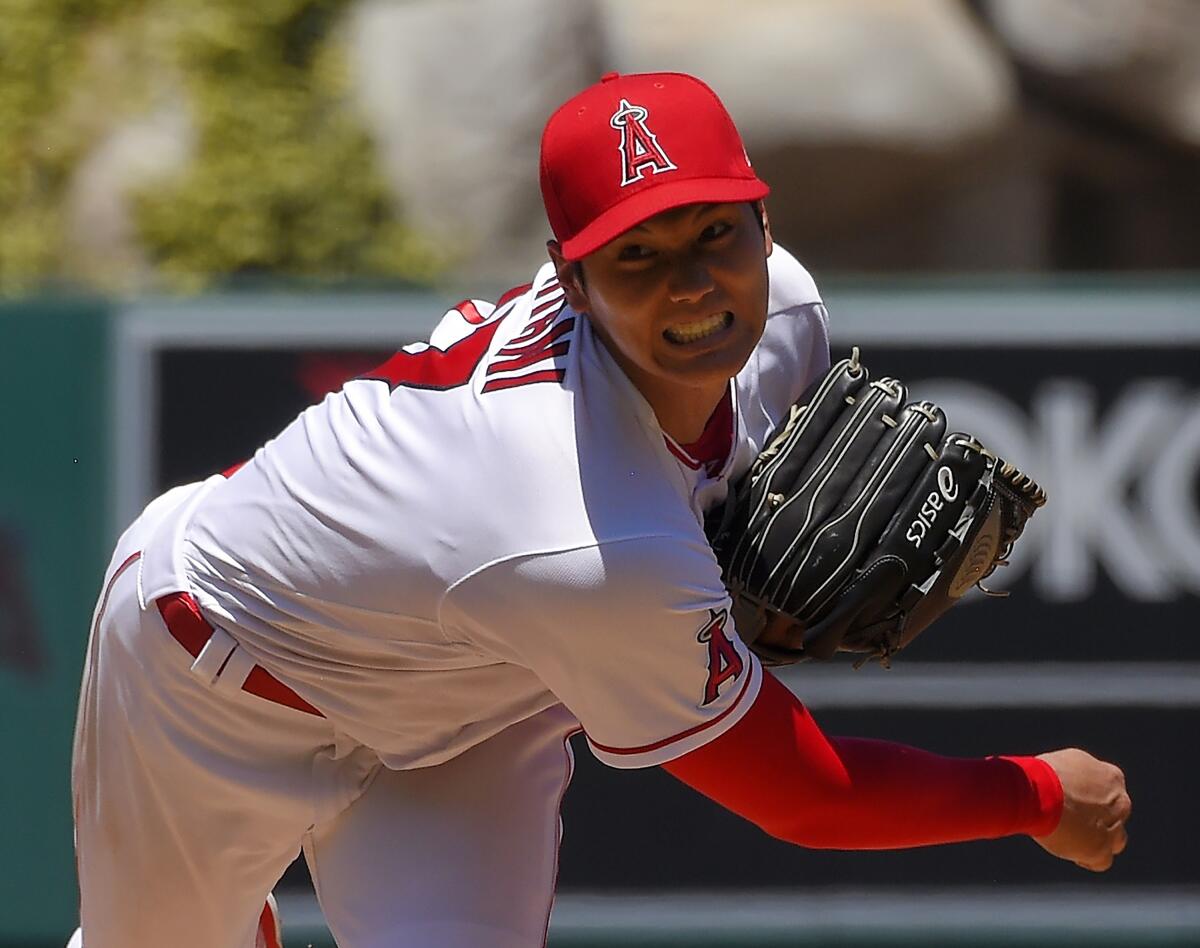
Although Minasian said last month he expected an arbitrator to decide Ohtani’s case, neither camp ended discussions. The strangeness of Ohtani’s case merited further consideration.
“We just needed more time,” Balelo said in a videoconference.
There isn’t a precedent for handling the case of a two-way player, much less one for a star who barely had pitched in two seasons and was coming off a woeful campaign.
In his first attempt to pitch since undergoing Tommy John surgery in October 2018, Ohtani last summer totaled a mere 1⅔ innings over two early-season starts. He walked eight of the 16 batters he faced and labored to throw at his usual mid- to high-90s velocity. In the batter’s box, he hit .190 with 50 strikeouts and a .657 on-base-plus-slugging percentage in 153 at-bats, a severe drop-off from the .883 OPS he produced in 2018 and 2019.
The Angels are banking on Ohtani’s upside, particularly when it comes to his presence in a starting rotation that needs ace-level talent. Last time he was able to pitch with regularity, Ohtani threw 51⅔ innings over 10 starts in his rookie season, going 4-2 with a 3.31 ERA and striking out 63.
The Angels acquired veteran outfielder Dexter Fowler from the St. Louis Cardinals, who will pay $12.75 million of the $14.5 million he is owed in 2021.
The Angels also are banking on his health. Ohtani has not encountered any setbacks recovering from the forearm strain that cut short his return to the mound in 2020. He should be able to pitch once a week and serve as designated hitter on most other days, as he did in his rookie season in 2018. How often he hits or pitches will be determined by the Angels medical staff, Balelo said
“From where he’s at this offseason, the amount of work he’s put into it, I know he’s in a really good place mentally and physically,” said Minasian, whose first spring training as GM of the Angels is scheduled to begin next week. “I’m really excited to see him in spring training. I’m excited to build a relationship with him. And I’ve heard nothing but great things, from a human-being standpoint. I think this is good for both sides.”
Angels acquire pitcher Aaron Slegers
The Angels acquired right-hander Aaron Slegers from the Tampa Bay Rays in a trade late Monday. Slegers, 28, threw 26 innings and had a 3.46 ERA in 11 regular-season games. A swingman, he made a spot start in August and threw four no-hit innings against the Toronto Blue Jays.
Opponents who made contact against Slegers last season averaged an 86-mph exit velocity. Only 8% of MLB pitchers were better than him at limiting hard contact, according to Baseball Savant.
Slegers, who is 6 feet 10, primarily throws a pair of 91-mph fastballs and a mid-80s slider.
A product of Indiana University, he was drafted in the fifth round in 2013 by the Minnesota Twins. He will take the roster spot of left-hander Dillon Peters, who was designated for assignment.
More to Read
Go beyond the scoreboard
Get the latest on L.A.'s teams in the daily Sports Report newsletter.
You may occasionally receive promotional content from the Los Angeles Times.
